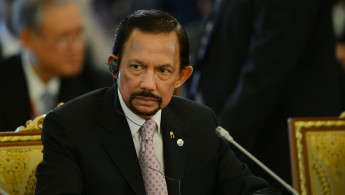Brunei defends stoning for gay sex in letter to EU
Brunei has defended its decision to introduce death by stoning as a punishment for gay sex in a letter to the European Union, it was revealed on Monday.
The Southeast Asian state sent the letter to the EU last week, ahead of a vote in which MEPs backed a resolution condemning the new sharia penal code.
The four-page letter delivered by Brunei's delegation to the international body said that the penalty would rarely be carried out due to its requirement of two male witnesses of "high moral standing and piety".
"The penal sentences of hadd - stoning to death and amputation - imposed for offences of theft, robbery, adultery and sodomy, have extremely high evidentiary threshold, requiring no less than two or four men of high moral standing and piety as witnesses, to the exclusion of every form of circumstantial evidence," the letter said.
The new code stipulates death by stoning as a punishment for sex between men, while women convicted of having sexual relations with other women face up to 40 strokes of the cane or a maximum 10-year jail term.
The wealthy sultanate, which is ruled by one of the world's richest monarchs, Sultan Hassanal Bolkiah, also defended its decision to introduce whipping in the letter.
"The offender must be clothed, whipping must be with moderate force without lifting his hand over his head, shall not result in the laceration of the skin nor the breaking of bones, and shall not be inflicted on the face, head, stomach, chest or private parts," it stated.
Brunei is an absolute monarchy which has been ruled for 51 years by Sultan Hassanal Bolkiah.
Bolkiah - who is one of the world's wealthiest men and lives in a vast, golden-domed palace - announced plans for the code in 2013.
The first section was introduced in 2014 and included less stringent penalties, such as fines or jail terms for offences including indecent behaviour or skipping Friday prayers.
The laws, which also include amputation of hands and feet for stealing, make Brunei the first place in East or Southeast Asia to have a sharia penal code at the national level, joining several - mostly Middle Eastern - countries such as Saudi Arabia.
Amnesty International and other human rights groups condemned the changes in the law.
"This new penal code allows punishments such as amputation or death by stoning which are unspeakably cruel and have no place anywhere in the world," Amnesty said in a statement earlier in April.
"We are alarmed that the code criminalises behaviour that should not be considered crimes at all. The international community must continue to condemn Brunei's decision to put these cruel penalties into practice."





 Follow the Middle East's top stories in English at The New Arab on Google News
Follow the Middle East's top stories in English at The New Arab on Google News
![The UAE is widely suspected of arming the RSF militia [Getty]](/sites/default/files/styles/image_330x185/public/2024-11/GettyImages-472529908.jpg?h=69f2b9d0&itok=Yauw3YTG)
![Netanyahu furiously denounced the ICC [Getty]](/sites/default/files/styles/image_330x185/public/2024-11/GettyImages-2169352575.jpg?h=199d8c1f&itok=-vRiruf5)
![Both Hamas and the Palestinian Authority welcomed the ICC arrest warrants [Getty]](/sites/default/files/styles/image_330x185/public/2024-11/GettyImages-2178351173.jpg?h=199d8c1f&itok=TV858iVg)